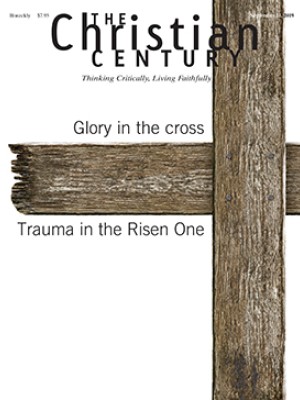The refugees on my church’s cricket team
How we stopped seeing a destitute “them” and started seeing wicket keepers and off spinners.

I’ve spent more time playing sports in the church than I did as a university student. My seminary had a soccer team. We played other seminaries in Scotland. One year the feared Presbyterian team Faith Mission, largely made up of Northern Irish players, was paired with the Glasgow Roman Catholic seminary and withdrew for theological reasons—leaving our path to glory uninhibited. My first parish had a soccer team, too; the local boys’ club was famous for having produced a string of players for the national team, so it was never clear whether the soccer field or the sanctuary hosted the true local religion.
Church of England dioceses compete for the Church Times Cricket Cup, so for my first ten years or so in ministry I could be found among the callow curates, sneakily calculating how we could book a Monday afternoon and evening off to take on our fearsome rivals in the early rounds. (We never reached the later rounds.) I never determined whether it was best to think of this as appropriate clergy fellowship and healthy physical exercise—as opposed to keeping it a secret from those who believed my life was laid down sacrificially in the cause of weekday pastoral care.
Read our latest issue or browse back issues.
My best-known predecessor at St. Martin-in-the-Fields, Dick Sheppard, came from an era when cricket was widely seen in England as the fourth C (along with Christianity, commerce, and civilization) that brought blessings to the empire and not just to the imperialists. A famous photo shows him donning cricket whites and pads and offering a forward defensive on a makeshift pitch in Trafalgar Square. So it was not a complete surprise when, shortly after I began as vicar, I received an invitation to join a St. Martin’s team. The competition had the same features that I recalled from diocesan days—regressive boyish indulgence, attempts at magnanimous sportsmanship, and a hearty visit to the pub afterward. It also provoked the same bewilderment, among more earnest congregation members, that this was considered a good use of the vicar’s time.
As with doyens of any sport, the devoted cricket lover is always on the lookout for talent. And so it was that when we started our sustained work with asylum seekers a volunteer observed one day that, since several of them hailed from the Indian subcontinent, it might be worth asking if they could handle a bat or send down a ball at genuine pace. From that moment on, there came about a radical change in our whole attitude. No longer did we think, These people need a sandwich . . . a shelter . . . a lawyer. Now we thought, We need a wicket keeper. Do you bowl fast, or leg spin? Could you open the batting?
Overnight we acquired a fearsome fast bowler, an aggressive opening batsman, and a devilish off spinner. We went from being seen as a team only around for the beer to having other teams’ captains take ours aside, saying, “Tell your fast bowler to back off a bit, will you—he’s a bit too quick for us and we want to make a proper game of it.”
No longer were we the benefactors and the asylum seekers the needy. No longer were the destitute “them” and the avuncular Samaritans “us.” No longer were we saying, “Sorry we can’t field a proper team, but do you mind if we include a few of these homeless guys to give them something to do?” Instead, other teams were saying, “You guys are just too good for us—we don’t have any asylum seekers to lead our bowling attack.”
Entirely by accident, we’d stumbled upon the secret of incarnational mission: it’s not that we are the bountiful, the generous, and the gracious, with too many resources to keep to ourselves, feeling guilty and responsible in the face of an ocean of need. It’s that we are all too aware of where we fall short—and, with unquestionably mixed motives, we are suddenly seeing assets in those in whom we had hitherto seen only deficit. And step by imperceptible step, we are seeing relationships of dignity and mutuality arise where before there had been transactional charity and condescension. Oh, how I lament those migrants who cross the English Channel to be seen only as a problem, and never as a gift!
At the most recent game we fell, inevitably, to digesting the recent, almost miraculous, victory of England over New Zealand in the World Cup final—the nail-biter turning on a rare award of four extra runs to England as a result of a freak overthrow. Our fast bowler shook his head and said, “England shouldn’t have accepted the victory in such circumstances.” He added the proverbial phrase, “It’s not cricket.” Here was a refugee, persecuted so horribly in his own country that he preferred to live on the streets of London, holding our team to a higher moral standard than the newly crowned world champions. Here was a man consigned to the gutter, making us all aspire to be better cricketers and better people.
I no longer sneak away to play cricket. I make sure the whole community knows—and sees a photograph in our weekly newsletter of our rainbow team, which brings me close to the kingdom of God. Cricket is no longer one of my guilty pleasures; it’s one of my proudest moments. Salvation has come, in the form of a fast bowler.
A version of this article appears in the print edition under the title “Bowling together.”







